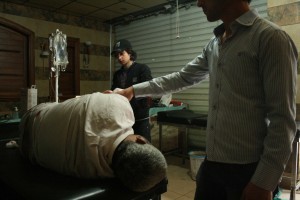Medical Centre in Aleppo Faces Lack of Funding

Lina al-Hakim *
(Aleppo, Syria) – The Bustan Al-Qasr centre is a little medical centre with just four beds. It is one of two medical field centres in Bustan Al-Qasr that treat diseases that have transformed and spread into epidemics: hepatitis, measles, typhoid fever, and skin diseases, especially leishmaniasis, or “Aleppo boil” as it has become known locally, which is transmitted by sand flies. In addition to these diseases, the field centres also treat up to 15 gunshot wounds a day, according to medical staff. The two neighbourhood centres also treat burns and minor injuries to ease the pressure on hospitals, which receive the most severely wounded war casualties.

While this particular centre is lucky to have a defibrillator, and an ultrasound machine, it lacks physicians, unlike the other centre in Bustan Al-Qasr, which has a nerve specialist. The medical staff in this simple clinic take pride in being able to serve the community by performing simple procedures. They were shocked, therefore, when the United Medical Council, an umbrella group for local medical organizations loyal to the opposition, cut its support for the centre because it does not have a physician. Now, it is reliant on the Free Medical Union, a medical NGO that operates in opposition-controlled districts of Aleppo and its countryside.
The Free Medical Union gets funded by different sources, especially Syrian charities outside the country, but this support only enables it to cover basic supplies and medicines needed by the Bustan Al-Qasr medical centre, and does not provide enough money for workers’ salaries or for fuel to run the generators during power outages.
The eight employees, who range in age from 22 to 26, are naturally unhappy to see their funding cut. One is a student at Aleppo’s Medical Technical Institute, which trains medical technicians and paramedics, while the others have undergone emergency response training.
“Now, after nearly nine months, [the council] decided to cut our funding, but we didn’t have a doctor with us when we started, so why now?” one of the employees complains.
He goes on to say that cutting the centre’s support will affect the neighbourhood and increase pressure on hospitals, especially given that many residents have started to return, thus increasing the number of injuries from shelling.
“We are the only ones who offer free treatment for ‘non-Assad’-related injuries,’” he adds, referring to regular cases of sickness and injury not directly related to the war.
A member of the United Medical Council told The Damascus Bureau that the council usually only supports medical centres that have at least one doctor, but the one at Bustan Al-Qasr was put together quickly to meet an immediate need. After the council opened a new clinic with several doctors on staff, there was less of a need for the Bustan Al-Qasr Centre, so the council decided to close it.
When asked why the council decided to close the centre altogether rather than securing a doctor for it, the council member says: “clinics have more than one doctor,” pointing out that full-fledged clinics will be better able to perform this type of work.
Six clinics have recently opened in the Aleppo neighbourhoods of Al-Hallak, Dahrat Awad, Fardaous, Bustan Al-Qasr, Maadi and Mayser. The services offered differ slightly from one facility to another, but in general they include general internal medicine, physical therapy and treatment of diseases such as tuberculosis and diabetes. However, they lack emergency rooms, employees of the Bustan Al-Qasr medical centre point out.
Another member of the council who spoke on condition of anonymity admitted there is a dire need for medical mobilization to confront certain epidemics. According to a council study, the city requires about 60,000 vials of Glucantime a month to stem the leishmaniasis outbreak. The medicine is manufactured in France but is also produced locally under the name Miglone by a company called Ibn Hayyan. Both versions of the drug have proved difficult to secure; international organizations have not allocated many resources for epidemiology and many drugs are not available locally, even in areas controlled by the central government in Damascus. Many labs have suspended their work or reduced production, and shipping across Syria has become difficult.
*Lina al-Hakim is a pseudonym for a journalist living in Syria
